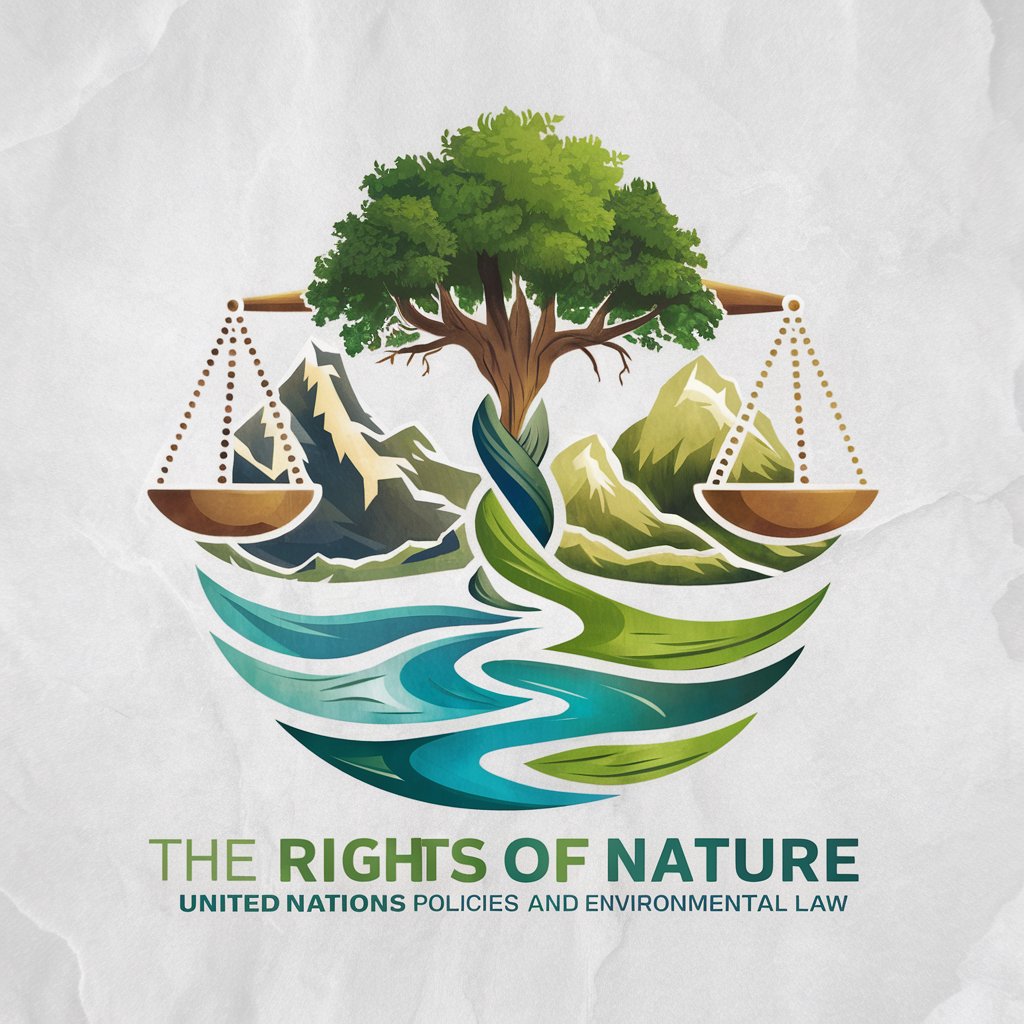Earth Law - AI-powered Legal Insight

Welcome! Let's explore the rights of nature and global environmental laws.
Empowering Nature through AI
How does the United Nations address the rights of nature through its policies?
Can you explain the impact of international treaties on environmental legislation?
What are some examples of countries recognizing the rights of nature?
How do ethical perspectives influence the legal recognition of nature's rights?
Get Embed Code
Understanding Earth Law
Earth Law, also known as the rights of nature, is an emerging field in environmental law that advocates for legal rights for ecosystems and natural entities. It encompasses legal and ethical frameworks that recognize the rights of nature to exist, persist, maintain, and regenerate its vital cycles. This concept shifts the traditional human-centric environmental policies to a more holistic, ecocentric approach where nature is seen as a subject of rights. For example, granting a river the legal status of a person enables it to be represented in court and have its interests protected against pollution or unsustainable exploitation. Powered by ChatGPT-4o。

Core Functions of Earth Law
Legal Representation for Nature
Example
Rivers, forests, and ecosystems can be granted legal personhood. For instance, the Whanganui River in New Zealand has been recognized as a legal entity with rights, allowing it to be represented by guardians in legal matters.
Scenario
In scenarios of environmental degradation, these legal entities (like the Whanganui River) can be parties to lawsuits to address and rectify issues such as pollution or illegal logging.
Policy Advocacy and Development
Example
Earth Law advocates work with governmental bodies to draft and implement policies that integrate the rights of nature into existing legal frameworks.
Scenario
This function is applied in drafting new environmental regulations that require assessments of ecological impacts not only from a utilitarian perspective but also from the perspective of the natural entities' rights to thrive and regenerate.
Public Education and Awareness
Example
Educational campaigns and workshops to inform the public and stakeholders about the importance and implications of recognizing the rights of nature.
Scenario
An example is organizing community workshops that explain how local ecosystems benefit from legal protections and what citizens can do to support such initiatives.
Who Benefits from Earth Law?
Environmental NGOs
Non-governmental organizations focused on conservation and environmental protection can utilize Earth Law frameworks to advocate for and implement stronger protections for natural entities.
Governmental Policy Makers
Policy makers at local, national, and international levels can use Earth Law principles to draft and enact laws that recognize the rights of ecosystems, potentially leading to more sustainable environmental policies.
Educators and Researchers
Academics and researchers in the fields of environmental science, law, and ethics can explore and expand on the theoretical underpinnings of Earth Law, contributing to its development and application in various legal contexts.
Legal Professionals
Lawyers and legal advisors can specialize in Earth Law to represent natural entities in court or help shape public policy, using the legal framework to litigate on behalf of nature.

How to Use Earth Law
Start Free Trial
Visit yeschat.ai to begin a free trial without any login requirements; no ChatGPT Plus subscription is needed.
Explore Features
Familiarize yourself with the tool's features, especially those focusing on environmental law and UN policies regarding nature's rights.
Define Objectives
Clearly define your objectives for using Earth Law to ensure that the information provided matches your specific needs, such as academic research or policy analysis.
Interactive Queries
Interact with the tool by asking specific, detailed questions to obtain comprehensive and accurate responses tailored to your requirements.
Apply Insights
Utilize the insights and data provided to support your projects, presentations, or discussions on environmental legislation and the rights of nature.
Try other advanced and practical GPTs
Earth School
Empowering global learning through AI

Earth Sciences
Empowering Earth Science with AI

Reformed Theology
Deepen Your Faith with Reformed Wisdom

Reformulator
Elevate Your Text with AI

Reformulation
AI-powered precision in text reformulation

Julie, Correctrice / Traductrice / Reformulatrice
Empower your words with AI

Earth Traveler
Your AI Companion for Unforgettable Journeys

Earth Sucks
Unlock Earth's Secrets with AI

Earth Explorer
Uncover Earth's Past with AI

Earth Engine Assistant (Pro)
AI-powered Earth Engine Coding Assistant

Murmurs of the Earth
Connect with nature through AI.

Tiny Explainer
Igniting Curiosity with AI

Detailed Q&A on Earth Law
What is Earth Law in the context of environmental legislation?
Earth Law refers to legal principles and frameworks that grant legal rights to natural entities like rivers, forests, and ecosystems. It encompasses laws that recognize these rights, aiming to ensure their protection and conservation within the broader scope of environmental law.
How does Earth Law relate to United Nations policies?
Earth Law aligns with various UN policies by advocating for the rights of nature, similar to how human rights are protected. This includes initiatives like the UN's Sustainable Development Goals, which emphasize the importance of environmental sustainability and the legal rights of natural entities.
Can Earth Law assist in drafting environmental policies?
Yes, Earth Law can assist policymakers by providing insights into international norms and legal precedents concerning nature's rights, which can be instrumental in drafting robust environmental policies that incorporate these principles.
What are the ethical implications of implementing Earth Law?
Implementing Earth Law raises ethical questions about the balance between human needs and environmental preservation. It challenges traditional views of nature as property and promotes a paradigm where nature is seen as a legal entity with rights, deserving of moral consideration and legal protection.
How can educational institutions benefit from Earth Law?
Educational institutions can use Earth Law to enrich their curriculum by incorporating lessons on the rights of nature, developing new courses on environmental law, and fostering a deeper understanding among students about the legal perspectives on nature's rights and their global implications.
